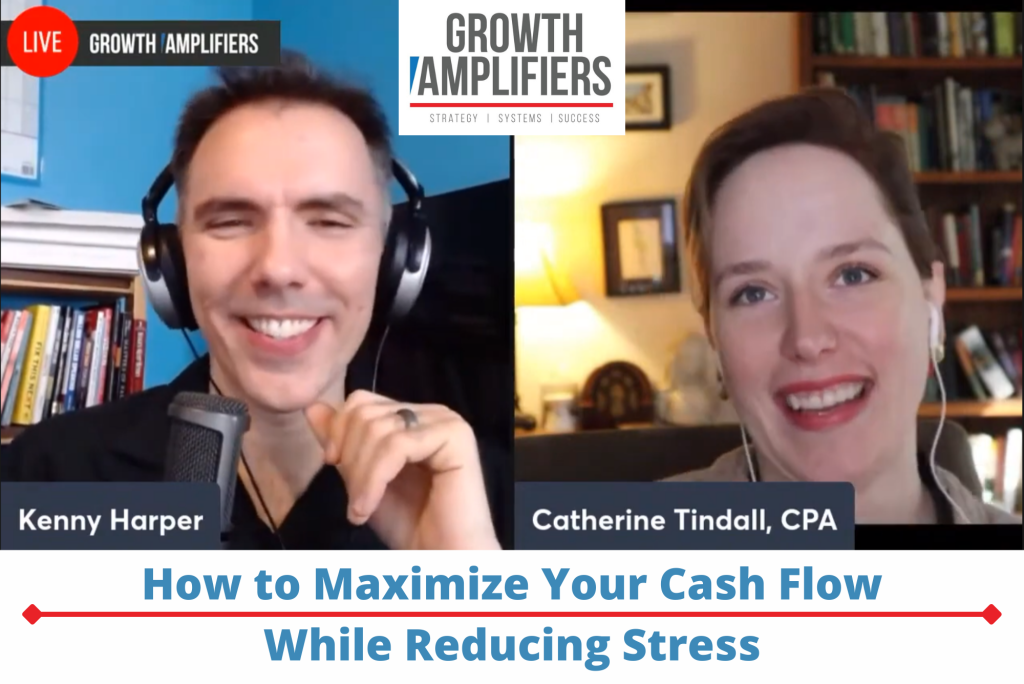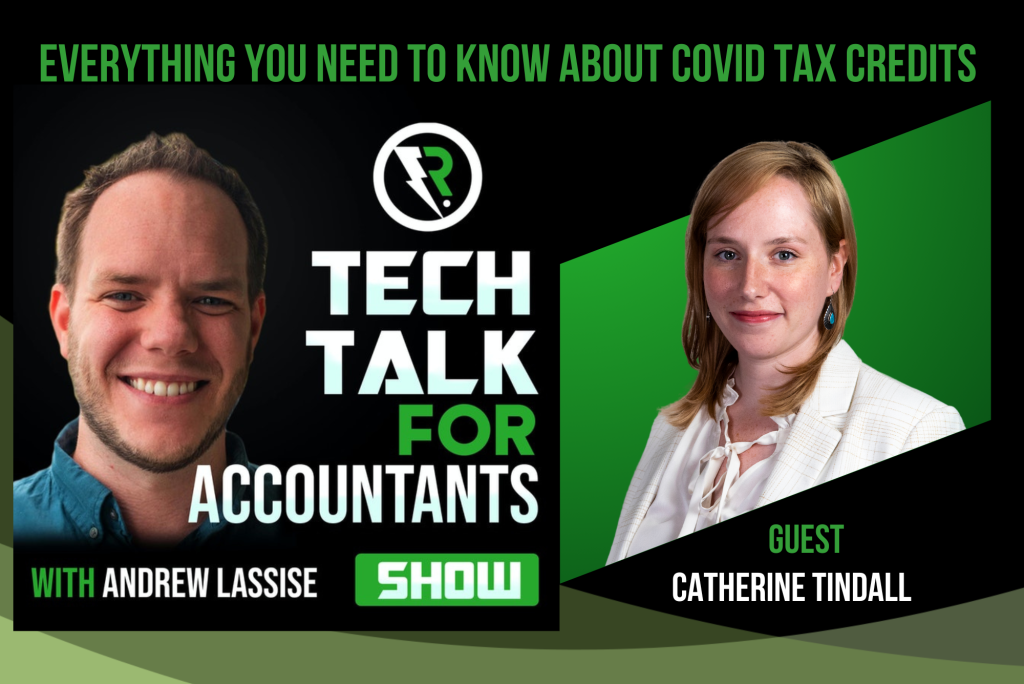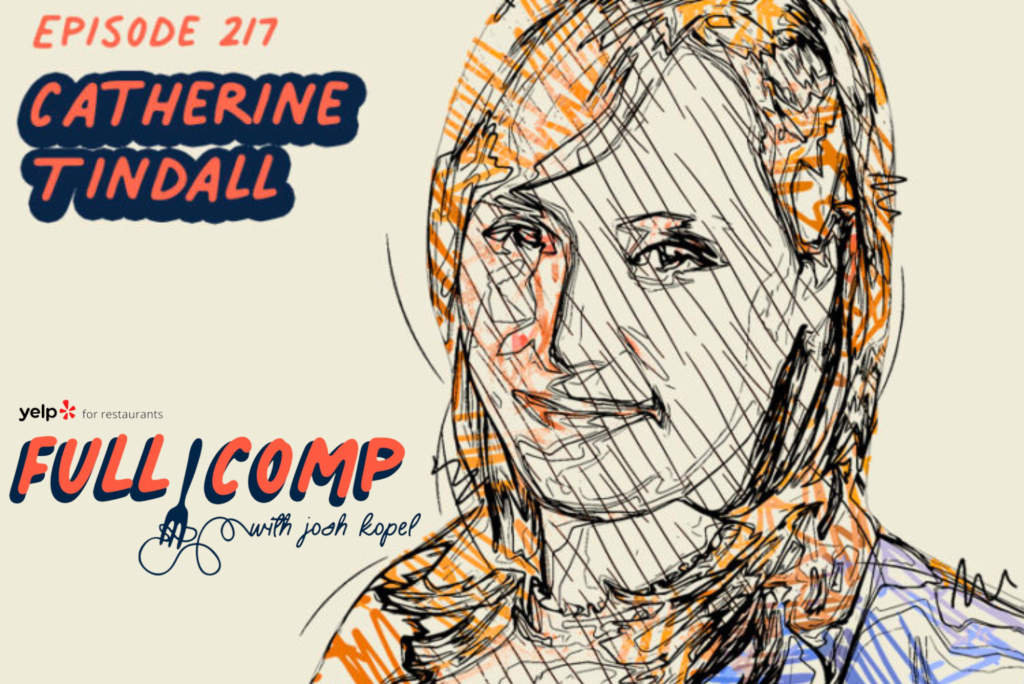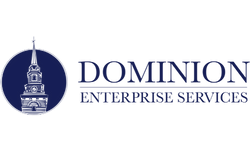
How to Maximize Your Cash Flow While Reducing Stress
00:05 [Music]
00:07 [Kenny Harper]
Hey there amplifiers! Thanks for tuning in today. We’re going to be talking about some actions that you can take. Some paradigms that you could begin shifting so that you can maximize your cash flow while reducing stress. Because is it fun to not have good cash flow? No, it’s not.
00:27 If you’re tuning in now, make sure that you subscribe at growthamplifiers.com. We’re on several different podcast distribution channels all over the place and we’d like to have you tune in and subscribe. We’d also like you to tune in and take action. If you’re hearing things that are resonating with you, share your comments, give your likes, give your thumbs up. We’d love to hear that. Our guests love to see it as well.
00:52 Also feel free to ask questions. If you’re catching this on a replay, we do come back, look at our questions periodically and we try to get those questions answered. So if you do have a question and you’re thinking, hey you know what? I’d like some more insight there. Please be proactive. Ask questions and take action. At the end of the day, you’re going to gain information. Information to take new actions. New actions lead to new results. That’s what we’re here for. So let’s make it happen.
01:21 Now the big idea that we know, cash flow is critical. We need to have good cash flow. It is critical for business and without healthy cash flow, well we could have high stress. That’s no good. We have lower business value, that’s not good either and/or it could be game over! That’s really not good, especially if you’re trying to run a business. So we’ve got to pay attention to cash flow. It is the life and blood of a business. It deserves your focus and attention.
01:54 So glad you’re tuning in, spending a little bit of time to learn about some things you do to elevate your cash flow. Our guest today, Catherine Tindall is a CPA. She is a CPA and partner of Dominion Enterprise Services, which is a concierge for tax advisory. She’s an expert on tax resolution and also she provides compliance for entrepreneurs. So I’d like to welcome to Growth Amplifiers, Catherine Tindall.
02:31 [Catherine Tindall]
Thank you so much Kenny. It’s really great to be here.
02:34 [Kenny]
It’s great to have you here. It’s great to be celebrating. We’re in the week of thanksgiving and so we have a lot to be thankful for.
02:43 [Catherine Tindall]
Yes, for me the one thing I’m probably most thankful for, recently is tax reform isn’t on us yet. So I can enjoy my thanksgiving without having to read some long legislation. I’m okay with that
02:57 [Kenny]
I know you’re joking but you’re also very serious at the same time because there are a lot of changes coming down the pipeline. It’s going to be really hard for the everyday person to even have a clue of what to do. So I’m glad we have professionals like yourself who are studying. Who are keeping track of that for us, so that we can make sure that we’re doing the right things.
03:23 I know that every CPA is not created equal. What I like about your approach is that you’re proactive. Would you mind showing us a little bit about what inspired you to get and to become a CPA in the first place?
03:42 [Catherine]
Well, what inspired me to join the profession is, originally I wanted to be in medicine. My parents are actually both CPAs and have their own tax practice and kind of on a whim they told me, use one of your electives, take an accounting course. And as you can tell where that ended up. But I found a combination and I’m sure your listeners find the same thing that when you have a line of work, where you really do create value for other people. That you serve other people. That you’re bringing goodness to their life. That’s really satisfying in a way that just doing something mindless is not. So that’s kind of how I got into the profession. I really enjoy the nature of taxation because to me, it’s like I get paid to do sudoku all day.It’s really fun for me.
04:36 [Kenny]
I had a very similar experience on my journey to become the marketing advisor and growth coach that I am today. When I started off, I was doing website design and I liked the puzzle of putting things together and making something work.
04:52 [Catherine]
Yep.
04:54 [Kenny]
I know with numbers, there’s a mess of numbers. People have all this stuff going on in their business but if they don’t know how to organize it and don’t know their options of how they can improve their cash flow or save more taxes then they’re going to be limited on what’s possible for them.
05:15 [Catherine]
Yeah for sure! And I think a lot of people, especially entrepreneurs who have gotten through that first leg of growth on their own and they’re more established. You’ve done everything that you can to improve your revenues to drive sales and increase conversion rates. You’ve done as much as you can to increase that top line number. Then on the other side, having a good business model so you’re able to do high margin and decrease your expenses. That’s a lot that you can control yourself. You can control those factors that are going to seriously impact cash flow. For a lot of people, it’s after the fact when they start to think about tax. Because you’re not having to deal with it in the day-to-day of your business and it’s not something that you usually handle yourself. It is really complex and so it feels like it’s out of your hands. For a lot of people that come to me, they’re just resigned to, “okay, tax is just going to wipe out 20 to 50 percent of my work and there’s not much I can do about it”. The mindset shift that I try to preach is, there are things that you can do about it. That’s a hidden area where you can do certain activities and dramatically increase your cash flow from your business, by modifying things around taxation.
06:38 [Kenny]
So you can be proactive and actually change the outcome. Let’s start unpacking this. We hear the term cash flow and some people get the idea. But why is it so critical for a business to pay attention to this and be proactive when it comes to their cash flow?
07:01 [Catherine]
A lot of people, especially early on in their business, get really obsessive over profit which is good. That’s a good number to be sensitive to but what you make in profit is how you’re getting taxed. The US system, it’s an income tax basis and it’s usually calculated off of that profit number. If you’re trying to drive really high profit you’re going to be paying high taxes. You still want to have that kind of profit built into what you’re doing but being sensitive to ways. It depends on what your goals are. If you’re going to be selling your business, you don’t want to have it, not showing a profit. But are there ways that you can tinker with that top line number to show something like a paper loss and still get cash flow so that you can keep going. That’s something I often see with real estate investors, where they’re throwing off paper losses using depreciation. And yet when you really think about it, outside of an accounting context they’re being profitable because their properties are appreciating and they’re getting cash flow without paying tax on it, if you can structure it correctly. That ends up being a much better scenario than just kicking off high profits and then losing 20 to 50 percent in income tax. That’s cutting out 20 to 50 percent of the cash flow from your business because you can’t really finance your taxes.
08:32 [Kenny]
As I’m hearing about it and thinking about some of the bigger companies who are more sophisticated. They work with people to figure out how they could save more money and maximize their dollar. For a lot of small businesses, they haven’t necessarily taken the time to do that. The trap one can easily fall into is, “I’ve taken my taxes get done by H&R Block or something. They’ll file the taxes for me and yeah! I did my taxes.” What you’re talking about is a deeper level in more of a strategic approach towards thinking about how you can maximize your bottom line beyond the common write-offs. That’s really powerful.
09:37 Can you give me an example, so that someone can get an idea?
09:46 [Catherine]
A common one is people don’t think about the overall tax exposure that they have. If they have a family that they’re very close with, an often tactic that I’ll talk to people about. This is a really small one that applies to a lot of people. Is there anything that you could have your kids do in your business because if they’re young enough you’re eligible for being able to pay them and not have to pay payroll tax on those wages. It shifts those wages from your high bracket, if it’s under twelve thousand dollars it’s zero bracket so it ends up being tax free money. Even more powerful thing is, if they don’t need those funds for other things they can contribute to a Roth account. So now you’re taking money that was never taxed on your return and then you’re putting it into a Roth and it’s going to grow tax-free over the course of your kid’s life. The nice thing with those is if they want to take it out in five to ten years to buy a house or to do something, they’re going to have this cash sitting there waiting for them that’s going to be tax free when they want to take it out. You can imagine the profound impact of that. Say you have a kid where they sit on it for the course of their life and take it out at retirement, you’re looking at several million dollars if you can do this strategy for years. It’s tax-free money!
11:18 That’s one technique that I always have in my mind that applies to a lot of people. They just don’t know about it. They don’t think about it because if you see your tax as something that you deal with at the end of the year, you get it done with. It’s annoying and you hate it. You miss out on a lot of these things, where if you modified your behaviors a little bit and knew how the rules worked you can take advantage of some of these really powerful techniques
11:47 [Kenny]
That is killer! If you’re a business owner, entrepreneur tuning in with children, consider what Catherine just said. Right now, you could be paying taxes on money which you could be using to set aside for your kids, tax free. Have your kids work for you. It doesn’t have to be complicated but have them contribute to your business. Giving them some responsibility, also helping you out and helping them out as well. It’s a trifecta of wins. Wins are all over the place. That’s a really powerful strategy.
12:35 What are some of the common mistakes to avoid when it comes to cash flow tax planning things of that nature? We’re all human. We’re all easy to make mistakes. Sometimes we think we know what we’re doing. We may be doing great in one area and shooting our foot in the other, we’re not even aware.
13:01 [Catherine]
First mistake I see is not being proactive about it. Not addressing it before the end of the year or just not addressing it. I had someone that I was talking to the other day who’s an architect with a big architecture firm. He was talking about how he had bonused himself out in his company, over a million dollars and a big chunk of that got wiped out to tax. It wasn’t until the year after, he started to try to find answers for that. So the first mistake is just to wait too long. To realize that if you’re working with the tax professional, it’s worth it to talk to them during the year and ask them for more work than just filing the tax return and ask, for planning engagement. Is there anything that we could do here just to save me more?
13:50 The second mistake is they try to DIY it, when it comes to trying to execute some of these techniques themselves. It’s very easy to miss a step or mess it up and it just will wipe out the whole thing. So I had another case recently of a real estate investor who had come to us. He had set up a 1031 exchange. If you’re not familiar with the 1031 exchange, any listeners out there, it’s basically a specialty tax technique where you’ve purchased a property that you’re using and you’re renting it, you’re able to sell that property, buy a replacement property and not pay capital gains tax. But you have to follow some pretty specific steps in order to get it to work. So he had done a lot of the steps himself, he thought he was going to get it to work and then he didn’t do it correctly. By the time he talked to me, he didn’t qualify for the treatment so he was looking at over two hundred thousand dollars in taxes. That if he had just worked with somebody, could have just deferred it for decades. Because the nice thing with those is you can just keep rolling them forward every time you go to sell property. You can imagine over the course of his life a 200,000 tax hit now. What the lost appreciation of that money is going to be over the course of a life. I think trying to DIY it for too long. As you said, when we were talking before the show started, really seeking to sharpen the saw involves getting people who know what they’re doing to handle things that are complicated so that it’s just done correctly. And you’re not trying to teach yourself a tax code.
15:31 [Music]
16:08 [Kenny]
That’s a great piece of advice. I’m going to double down on it because I give the same advice. Have you ever seen a Pinterest fail of Cookie Monster? Have you ever seen that?
16:21 [Catherine]
I’ve seen some pretty good Pinterest fails.
16:24 [Kenny]
The thing is people see something and they say, “yeah I could do that.” then they miss important steps. And what they get, looks nothing like what they were intending to do. Sometimes these steps look so basic that I’m looking to bake bread. What is this yeast ingredient? It only costs for a half a teaspoon, I don’t know if I need it so maybe I’m not going to worry about it. I’ll just substitute nutmeg or something and then of course it’s not going to turn out the same. So I think it’s really critical to connect with a trusted guide that knows the details, and they can help you actually save time and get a better outcome. Usually they more than pay for themselves
17:16 [Catherine]
Exactly.
17:17 [Kenny]
I guess the challenge we have is, it takes a little bit of humility. Could be a little painful to get started there. However there’s the pain of discipline and the pain of regret. If you’re like most people thinking, you may have heard about, it’s probably better to save for retirement sooner rather than later. But a majority of people don’t get it done early,they get it done later. So, the point of the story is, don’t procrastinate. Connect with someone sooner rather than waiting and then finding out after the fact, yeah I should have done that.
17:59 [Catherine]
Yeah because for most serious entrepreneurs, your CPA is going to be one of the key relationships, as part of how you run your business. It’s your CPA. It’s your business attorney. It’s your banker. It’s your insurance guy. It’s one of those key relationships that as you get more complicated, you’re not going to be able to handle it. To your point, they usually pay for themselves, it’s a point of principle in our firm that we only work with clients that they’re going to get at least a 200% ROI on what we do. They’re able to know that up front so that you can make a decision, right? I think a lot of people get stuck in the mentality of thinking everything’s an expense and if you can shift your mindset into everything I’m doing, it should be an investment. If I’m incurring an expense it should be producing an ROI for me somewhere either it’s an emotional ROI or it’s a direct financial ROI. If something’s just a consumption thing that you’re doing, whether it’s an advisor or a service that you have and it’s not producing an ROI you shouldn’t be doing that. That’s a key thing on how I changed the structure of our firm. I wanted to be able to communicate that really directly with clients that the work with us, it’s an investment and it should be a profit center for you. I think every company that an entrepreneur works with, you should be able to frame it in your mind like that. Is this producing a good ROI? It’s important.
19:34 [Kenny]
Totally on board with that one. A lot of people can get caught up in the cost they pay for things and it’s cost. If you can end up saving more money than you’re spending or making money back more than you’re spending then you have a return. And if you think about it logically then you’re actually losing money by not taking that action. Make sure that you really evaluate those offers and when you have someone who has the knowledge and expertise, can save you time, can guide you through a process and they have some credibility behind them, why not take a moment to engage and learn about that?
20:20 Speaking of which, what would be the first steps for someone to take that maybe hasn’t gone through that engagement yet? They’re hearing about it and they’re thinking maybe that’s something I should do but is my business big enough? Would my business really benefit from this? Which steps should they take to start helping them gain the awareness of what they should be doing?
20:48 [Catherine]
I would say for most entrepreneurs out there. if you’re doing more than a hundred thousand dollars in profit, you should be engaging a tax professional. I would say for the added cost,it’s worth it to work with an actual CPA firm or an EA who has a tax advisory practice outside of like an H&R block or like a turbo tax just because you want somebody who is going to have a more vested interest in you and in a relationship with you. Because a lot of the time planning techniques and things that we do in our practice, it comes from really knowing the clients well and knowing what’s going on with them. So for me to give the advice to somebody to hire their kids, I already know you, know the ages of their kids, what’s going on with the kids and what kind of business the client has that’s actually going to be applicable and something we can pull off. On the technical side of it, you know that they’re in the right entity, that they’re going to get the benefit from it and how to run the payroll and all that technical stuff to execute.
21:58 I think the first step to start with is really evaluating where you are with that relationship. If you’re going for a self-serve option, I would consider shifting to someone who’s not going to be a self-serve option for you, that it’s going to be a relationship. How you find that relationship, if you already have a tax professional that you’re happy with I’d say the next step to that would be asking for a planning engagement from them because most accountants are not sales people. When you come to them they’re going to meet the minimum requirement which is making sure you’re compliant with your filing obligation, which is filing your taxes and remitting payment to the government. They’re going to make sure that you’re good on that. They don’t want you going to jail. They don’t want you getting IRS notices. But unless you ask for more, most of the time, you’re not going to get more. I’ve been in the industry a while, that’s not the mentality that most tax professionals have.
22:51 [Kenny]
Yeah, they may not be in the mindset to even be proactive looking forward. They may not have those skills. You may have someone that’s doing a really good job at what they do but they may not have the capabilities of being able to provide the value that you could have, by getting a second opinion.
23:09 [Catherine]
True! That’s what I usually say to anyone who approaches me that’s interested in having us look at their situation. More often than not or frequently when I see someone’s tax information, I can tell them, “Actually you’re tax optimized. Your previous CPA has you set up correctly. You should continue to work with them.” Because I can see what they’re doing and they’re taking advantage of what you’re eligible for. Almost every professional and professional services is willing to do a free consultation and so to really take people up on that and make sure you’ve got a good personality fit but also a good professional fit. So if you go to your account, “hey, can we do some planning work? Could you tell me about what I could expect for an ROI on that?”. If they’re able to communicate that well to you then that’s probably the kind of professional you’re going to want to work with.
24:05 [Kenny]
I like it. I like it a lot. Speaking of which, Catherine and her company mentions, they do have a complimentary consultation. You can go to their website dominiones.com. You go to the contact page, there’s a great form on there that will help get you signed up. You can experience that for yourself. If you haven’t worked with a tax planner, you haven’t had someone take a look at your business from that level before, I suggest just getting it checked out. It doesn’t hurt to get some ideas.
24:50
What I really liked about what you just said a moment ago, is if someone’s doing good already you’ll just basically affirm, “hey you’re doing good! You’ve got things set up and that’s really refreshing”. That’s my approach, how I work as well, when I’m reviewing someone’s business. If they look like they’ve got everything together then I’ll give that thumbs up. If there’s some areas that could use some improvement, I’ll just highlight. There’s some things you might want to consider and if you need help with implementation, let’s have a conversation. If you haven’t done so already, I suggest taking advantage of that. All you could do is learn something to help you benefit yourself, your business and your future. It couldn’t hurt you.
25:37
As we’re kind of wrapping, what is something that you’ve gained on your entrepreneurial journey that you think might be beneficial for others? It could be something tax related. It could be something completely different, something that you’ve learned and you found valuable.
26:04 [Catherine]
I started working at other CPA firms and seeing how things were done and the standards in the industry. So when I launched this firm, I really took the time before going into how we can make this model more efficient for our staff, for us, for our clients. Having that in mind before we started doing everything. For a lot of people they just start working. You start getting into it. You just keep going and to take a step back, actually plot out what the model is of how this works. The model of where are we providing value? Where are we getting traction for our clients? and how do we really emphasize that? That’s ultimately what’s important. How do we structure the business around that value that we provide because that’s what’s going to drive the most success for our clients and for us. Not getting caught in the weeds of all the little things. I found that mental exercise before we started doing a lot of things was extremely helpful for me because my industry is very traditional, I would say. So to really model what other companies in different industries are doing, unto my industry was a really helpful exercise for us.
28:12 [Kenny]
That is great insight. Those small subtle differences can make a huge impact on the experience that you provide which all comes back around. So it’s worth taking the time to step back, look, evaluate and if you can’t do everything start with one thing.
28:32
Catherine, thank you so much for being on growth amplifiers. For taking some time to share your knowledge and expertise, giving people paradigm shifts. Again, highly recommend reaching out to Catherine and her team. At the very least connect with the person that you’re working with now. Get some perspective. You take new actions and just see what’s possible. Until then let’s have an amazing and wonderful thanksgiving holiday weekend, coming up around the corner. If you’re tuning in this it’s not thanksgiving anymore, you can still be thankful this week for something. Let’s remember to be thankful always for the awesome things that we have in our lives. Thank you again for showing up and we’ll catch you around the campfire.
29:20 [Catherine]
Thank you so much Kenny! It was such a pleasure to be here.





